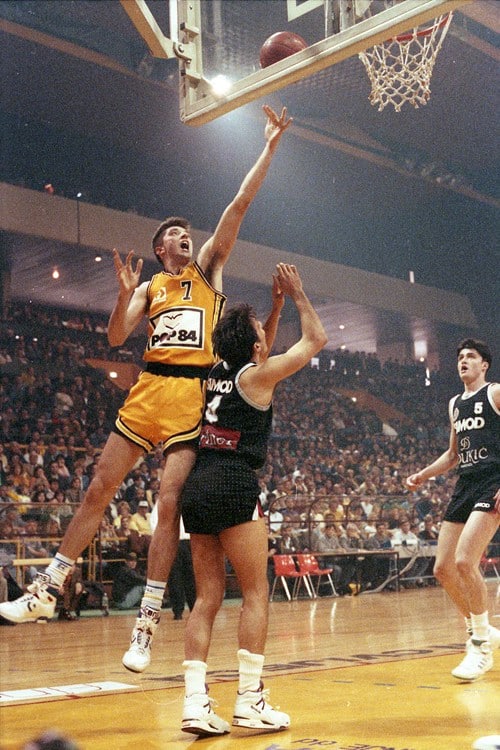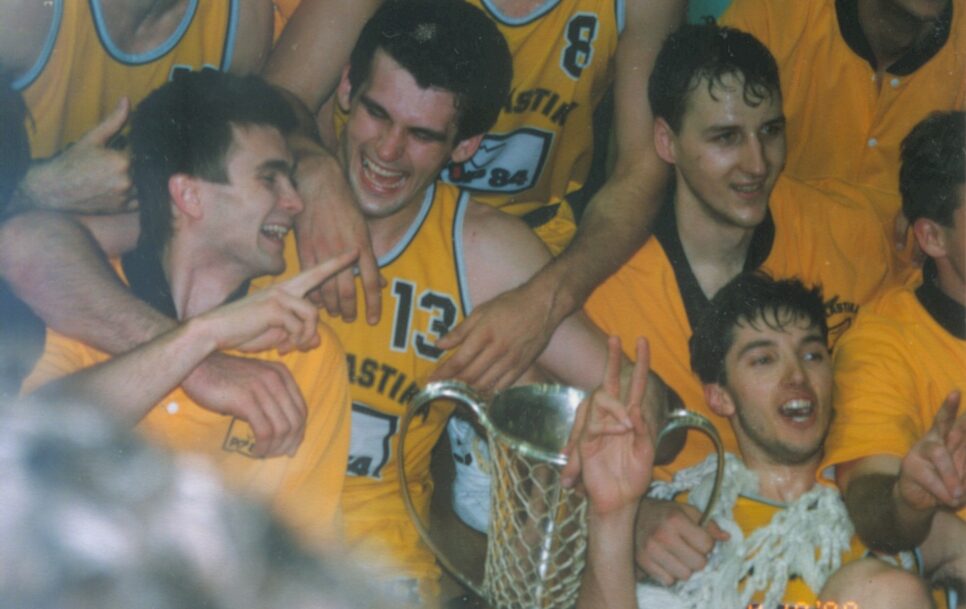Split’s golden era: the rise and fall of Europe’s basketball giants
Apart from Cedevita Olimpija, a joint Slovenian and Croatian club playing in the EuroCup, Croatian teams have not made a significant impact at the high levels of European basketball for a long time. However, during a period when the grass was greener and the sky bluer, Split, under the names Jugoplastika and POP 84, shone brightest in Europe.
In the history of the EuroLeague, only three teams have won the continent’s top club competition three consecutive years. ASK Riga dominated from 1958-60, Split reigned between 1989 to 1991.
In hindsight, Split’s titles were not surprising. During their championship runs, their roster included future NBA players Toni Kukoč, Žan Tabak, and Dino Rađa. Important figures such as Velimir Perasović, Zoran Savić, and Duško Ivanović, who later became notable coaches or club executives, also played significant roles.
But in 1989, when Split won its first trophy, their victory was a surprise. Let’s take a look at how it all happened.
It took time to win
Founded in 1945, the club took quite a while to become a major player domestically. Their first significant title came in 1971 when they won the Yugoslav championship, and they remained one of Yugoslavia’s top teams for the next two decades. They also made their mark in Europe, winning the third-tier Korać Cup in 1976 and 1977.
Božidar Maljković played a crucial role in Split’s rise to European prominence. Although not the club’s first, second, or even third choice as coach, his hiring in the summer of 1986, at just 34 years old, proved to be a masterstroke. Following the advice of Aleksandar Nikolić, regarded as the father of Serbian and Yugoslav basketball, Maljković was appointed despite some players’ reservations about his lack of experience as a head coach.
Among the skeptics was Rađa, one of Split’s top talents alongside Kukoč. The club expected Maljković to bring in experienced players, especially since several veterans had left the team that summer. However, Maljković’s only significant addition was 22-year-old point guard Zoran Sretenović from Crvena Zvezda, who had limited playing time in Belgrade.

Toni Kukoč was a boy from Split who helped the club become the ruler of Europe. Photo: kk-split.com
Maljković believed in discipline and intense training to elevate his players. Although his debut season didn’t produce notable results, it laid the foundation for future European dominance.
First EuroLeague title
In the summer of 1987, Maljković understood the need for experienced players to win titles. He brought in almost 30-year-old Ivanović from Budućnost Podgorica. Split, physically powerful that season, lost only one game in the Yugoslav championship’s regular season. Despite being knocked out in the Korać Cup quarterfinals, they won their first title under Maljković, becoming Yugoslav champions.
Given Split’s youth—both in players and coach—their success trajectory was clearly upward. In the 1988/89 EuroLeague season, they crushed Portuguese club Ovarense in the round of 16 and secured a spot in the final four with an 8-6 record in the quarterfinal group stage.
Split was not the favorite heading into the final four, with Israeli giant Maccabi Tel Aviv and Catalan powerhouse FC Barcelona leading the pack. In the Munich tournament, Split, led by Kukoč’s 24 points, defeated Barcelona 87-77 in the semifinals and beat Maccabi 75-69 in the final.
The summer of 1989 posed a threat as Rađa, who had shone against Maccabi, was drafted by the Boston Celtics. Though he was ready to move to the NBA for a good offer, Split, contractually binding him, resisted his departure. Maljković appealed to the Yugoslav Basketball Federation to prevent young players from going to the NBA. Rađa, undeterred, flew to the US and signed a one-year, $500,000 contract with the Celtics.
Split didn’t give up. They took the case to court in the US, which ruled in favor of the Croatian club, preventing Rađa from playing for the Celtics. To avoid wasting a year, Rađa returned to Split and reached an agreement with the team.
Maljković, amidst this legal battle, signed 22-year-old Savić, a solid big man slightly shorter than Rađa, who would play a major part in continuing their success.
In the 1989/90 season, Split was no longer a dark horse but a favorite in the EuroLeague. They secured a final four spot with an 11-3 record, behind only Barcelona’s two losses.
The Zaragoza tournament was Kukoč’s show. He was named MVP, scored the most points, and led Split to another victory over Barcelona, 72-67, in the final.
Although Split had again become Europe’s best, another summer threatened their stability.
A turbulent summer
Maljković, now the most sought-after coach in Europe, received numerous lucrative offers. After four successful seasons in Split, he moved to Barcelona. Željko Pavličević, Split’s new coach, took the opposite route, returning home after four seasons in Spain.
Several key players left in the summer of 1990 too: Rađa to Italy, Ivanović to Spain, and Goran Sobin to Greece. The main sponsor, Jugoplastika, was replaced by the Italian clothing company POP 84.
Despite significant changes, Split remained highly competitive. Kukoč, Perasović, Savić, and Tabak stayed, and the team maintained the rhythm and understanding developed over previous seasons. They won the Yugoslav championship and cup and claimed their third consecutive EuroLeague title in 1990/91.
Savić, who was brought in to perhaps replace Rađa, shone in the final four, scoring 25 and 27 points in the two games. Despite close contests, Split was crowned EuroLeague champions for the third consecutive year, defeating Barcelona, coached by Maljković.
The curse of war
Despite their dominance, fate dealt Split a heavy blow. In March 1991, just weeks before the EuroLeague final four, war broke out in Croatia, lasting over four and a half years.
Split, renamed Slobodna Dalmacija, played in the 1991/92 EuroLeague season, finishing fifth in their group, missing the quarterfinals.
The war significantly impacted the club, leading many key players to leave. Kukoč moved to Italy, Savić to Barcelona, and the club’s financial situation worsened, making it harder to retain and attract players.
Fortunately Split didn’t disappear from the basketball map. They reached the Croatian championship finals multiple times in the 1990s and won both the championship and cup in the early 2000s.
Today, KK Split competes in the Croatian championship and the Adriatic League’s top division, narrowly missing the playoffs last season.






